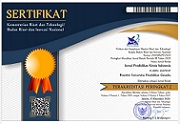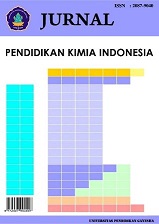Higher-Order Thinking Abilities for Improved Critical Thinking in Thermochemical Materials Module
DOI:
https://doi.org/10.23887/jpki.v6i2.42933Kata Kunci:
Module development, HOTS and critical thinking skillsAbstrak
The use of teaching materials that support higher-order thinking skills (HOTS) on thermochemical materials still needs to be improved, which makes students' critical thinking skills (CBC) low. The goal of this study is to find out if HOTS-based chemistry learning modules on thermochemical materials and improving CBC are possible and what students think of them when they are used. This study is a type of development research called "ADDIE" research. Three experts on materials, three experts on the media, and three teachers took part in this study. As the control group, 35 people were used, and as the experimental group, 36 people were used. In this study, both non-test and test methods were used to collect data. The non-test method was done with the help of a product validity questionnaire sheet, which was a research tool. On the other hand, the instrument test looked at how well students could think critically. Descriptive qualitative analysis, quantitative statistics, and inferential statistics are used to look at the data (t-test). The average CBC of students was different before and after they used HOTS-based chemistry modules to study thermochemistry materials. The results show that using HOTS-based chemistry modules to improve students' CBC is better than using standard modules. It was decided that chemistry modules based on HOTS could help students learn how to think more critically.
Referensi
Andrian, Y., & Rusman, R. (2019). Implementasi pembelajaran abad 21. Jurnal Penelitian Ilmu Pendidikan, 12(1), 14–23. DOI: https://doi.org/10.21831/jpipfip.v12i1.20116
Andriani, M., Muhali, M., & Dewi, C. A. (2019). Pengembangan Modul Kimia Berbasis Kontekstual Untuk Membangun Pemahaman Konsep Siswa Pada Materi Asam Basa. Hydrogen: Jurnal Kependidikan Kimia, 7(1), 25-33. https://doi.org/10.33394/hjkk.v7i1.1653. DOI: https://doi.org/10.33394/hjkk.v7i1.1653
Anggraeni, A., Supriana, E., & Hidayat, A. (2019). Pengaruh Blended Learning terhadap Kemampuan Berpikir Kritis Siswa SMA pada Materi Suhu dan Kalor. Jurnal Pendidikan: Teori, Penelitian, Dan Pengembangan, 4(6), 758-765. https://doi.org/10.17977/jptpp.v4i6.12505. DOI: https://doi.org/10.17977/jptpp.v4i6.12505
Astuti, R. T., & Olensia, Y. (2019). Pengembangan Modul Kimia Analitik Berbasis Inkuiri pada Materi Titrasi. EduChemia (Jurnal Kimia Dan Pendidikan), 4(2), 127-132. https://doi.org/10.30870/educhemia. v4i2.5326. DOI: https://doi.org/10.30870/educhemia.v4i2.5326
Azizah, M., Sulianto, J., & Cintang, N. (2018). Analysis of Critical Thinking Skills of Elementary School Students in Learning Mathematics Curriculum 2013. Jurnal Penelitian Pendidikan, 35(1), 61–70.
Benyamin, B., Qohar, A., & Sulandra, I. M. (2021). Analisis Kemampuan Berpikir Kritis Siswa SMA Kelas X Dalam Memecahkan Masalah SPLTV. Jurnal Cendekia : Jurnal Pendidikan Matematika, 5(2), 909–922. https://doi.org/10.31004/cendekia.v5i2.574. DOI: https://doi.org/10.31004/cendekia.v5i2.574
Chalkiadaki, A. (2018). A systematic literature review of 21st century skills and competencies in primary education. International Journal of Instruction, 11(3), 1–16. https://doi.org/10.12973/iji.2018.1131a. DOI: https://doi.org/10.12973/iji.2018.1131a
Dewi, N. W. R. U., Yasa, I. P., & Sujanem, R. (2020). Implementasi Model Self Regulated E-Learning Untuk Meningkatkan Keterampilan Berpikir Kritis Dalam Pelajaran Fisika Siswa. Jurnal Pendidikan Fisika Undiksha, 10(1), 24-29. https://doi.org/10.23887/jjpf.v10i1.26722. DOI: https://doi.org/10.23887/jjpf.v10i1.26722
Gazali, F., Yusmaita, E., & Ningsih, N. R. (2019). Pengembangan Modul Kimia Berbasis REACT untuk Meningkatkan Keterampilan Staf Pengajar Jurusan Kimia , FMIPA Universitas Negeri Padang. Jurnal Eksakta Pendidikan (Jep), 3(2), 142–151. DOI: https://doi.org/10.24036/jep/vol3-iss2/385
Hasanah, I., Melati, H. A., & Rasmawan, R. (2021). Pengembangan Modul Kimia Pendekatan Saintifik pada Materi Laju Reaksi di Madrasah Aliyah (MA). Edukatif : Jurnal Ilmu Pendidikan, 3(6), 4160–4171. https://doi.org/10.31004/edukatif.v3i6.746. DOI: https://doi.org/10.31004/edukatif.v3i6.746
Herawati, N. S., & Muhtadi, A. (2018). Pengembangan modul elektronik (e-modul) interaktif pada mata pelajaran Kimia kelas XI SMA. Jurnal Inovasi Teknologi Pendidikan, 5(2), 180–191. https://doi.org/10.21831/jitp.v5i2.15424. DOI: https://doi.org/10.21831/jitp.v5i2.15424
Hikmah, H., & Wibowo, E. W. (2020). The effectiveness of HOTS English module in English teaching and learning. 2020(2), 175–183.
Kimianti, F., & Prasetyo, Z. K. (2019). Pengembangan E-Modul Ipa Berbasis Problem Based Learning Untuk Meningkatkan Literasi Sains Siswa. Kwangsan: Jurnal Teknologi Pendidikan, 7(2), 91-97. https://doi.org/10.31800/jtp.kw.v7n2.p1--13. DOI: https://doi.org/10.31800/jtp.kw.v7n2.p91--103
Lestari, A., & Premono, S. (2019). Pengembangan Modul Kimia Berbasis Inkuiri Terbimbing Berorientasi Chemo-Entrepreneurship Materi Sifat Koligatif Larutan. Journal of Tropical Chemistry Research and Education, 1(1), 29–35. https://doi.org/10.37079/jtcre.v1i1.20. DOI: https://doi.org/10.37079/jtcre.v1i1.20
Masitoh, L. F., & Aedi, W. G. (2020). Pengembangan Instrumen Asesmen Higher Order Thinking Skills (HOTS) Matematika di SMP Kelas VII. Jurnal Cendekia : Jurnal Pendidikan Matematika, 4(2), 886–897. https://doi.org/10.31004/cendekia.v4i2.328. DOI: https://doi.org/10.31004/cendekia.v4i2.328
Rahayu, R., Iskandar, S., & Abidin, Y. (2022). Inovasi Pembelajaran Abad 21 dan Penerapannya di Indonesia. Jurnal Basicedu, 6(2), 2099–2104. https://doi.org/10.31004/basicedu.v6i2.2082. DOI: https://doi.org/10.31004/basicedu.v6i2.2082
Rapih, S., & Sutaryadi, S. (2018). Perpektif guru sekolah dasar terhadap Higher Order Tinking Skills (HOTS): pemahaman, penerapan dan hambatan. Premiere Educandum : Jurnal Pendidikan Dasar Dan Pembelajaran, 8(1), 78-84. https://doi.org/10.25273/pe.v8i1.2560. DOI: https://doi.org/10.25273/pe.v8i1.2560
Rofiah, E., Aminah, N. S., & Sunarno, W. (2018). Pengembangan modul pembelajaran ipa berbasis high order thinking skill (HOTS) untuk meningkatkan kemampuan berpikir kritis siswa kelas viii SMP/MTs. Inkuiri: Jurnal Pendidikan IPA, 7(2), 285-289. https://doi.org/10.20961/inkuiri.v7i2.22992. DOI: https://doi.org/10.20961/inkuiri.v7i2.22992
Romayanti, C., Sundaryono, A., & Handayani, D. (2020). Pengembangan E-Modul Kimia Berbasis Kemampuan Berpikir Kreatif Dengan Menggunakan Kvisoft Flipbook Maker. Alotrop, 4(1), 51–58. https://doi.org/10.33369/atp.v4i1.13709. DOI: https://doi.org/10.33369/atp.v4i1.13709
Roziyah, D. A., & Kamaludin, A. (2019). Pengembangan Modul Kimia Berbasis Chemoedutainment (CET) Pada Materi Reaksi Redoks. Journal of Tropical Chemistry Research and Education, 1(1), 21–28. https://doi.org/10.37079/jtcre.v1i1.19. DOI: https://doi.org/10.37079/jtcre.v1i1.19
Saputri, A. C., Sajidan, Rinanto, Y., Afandi, & Prasetyanti, N. M. (2019). Improving students’ critical thinking skills in cell-metabolism learning using Stimulating Higher Order Thinking Skills model. International Journal of Instruction, 12(1), 327–342. https://doi.org/10.29333/iji.2019.12122a. DOI: https://doi.org/10.29333/iji.2019.12122a
Selviani, I. (2019). Pengembangan Modul Biologi Problem Based Learning Untuk Meningkatkan Kemampuan Berpikir Kritis Peserta Didik SMA. IJIS Edu : Indonesian Journal of Integrated Science Education, 1(2), 147–154. https://doi.org/10.29300/ijisedu.v1i2.2032. DOI: https://doi.org/10.29300/ijisedu.v1i2.2032
Simangunsong, A. D. B., & Pane, E. P. (2021). Pengembangan Modul Kimia Dasar Berbasis Discovery Learning pada Materi Stoikiometri. Edukatif : Jurnal Ilmu Pendidikan, 3(6), 4415–4425. https://doi.org/10.31004/edukatif.v3i6.1472. DOI: https://doi.org/10.31004/edukatif.v3i6.1472
Suherman, Prananda, M. R., Proboningrum, D. I., Pratama, E. R., Laksono, P., & Amiruddin. (2020). Improving Higher Order Thinking Skills (HOTS) with Project Based Learning (PjBL) Model Assisted by Geogebra. Journal of Physics: Conference Series, 1467(1). https://doi.org/10.1088/1742-6596/1467/1/012027. DOI: https://doi.org/10.1088/1742-6596/1467/1/012027
Sumardiana, S., Hidayat, A., & Parno, P. (2019). Kemampuan Berpikir Kritis pada Model Project Based Learning disertai STEM Siswa SMA pada Suhu dan Kalor. Jurnal Pendidikan: Teori, Penelitian, Dan Pengembangan, 4(7), 874-878. https://doi.org/10.17977/jptpp.v4i7.12618. DOI: https://doi.org/10.17977/jptpp.v4i7.12618
Suryaningsih, S., Nurlita, R., Islam, U., Syarif, N., & Jakarta, H. (2021). Pentingnya lembar kerja peserta didik elektronik (e-LKPD) inovatif dalam proses pembelajaran abad 21. Jurnal Pendidikan Indonesia (Japendi). 2(7), 1256–1268. DOI: https://doi.org/10.36418/japendi.v2i7.233
Syahrial, Asrial, Kurniawan, D. A., & Piyana, S. O. (2019). E-Modul Etnokontruktivisme: Implementasi Pada Kelas V Sekolah Dasar Ditinjau Dari Persepsi, Minat Dan Motivasi. JTP - Jurnal Teknologi Pendidikan, 21(2), 165–177. https://doi.org/10.21009/jtp.v21i2.11030. DOI: https://doi.org/10.21009/jtp.v21i2.11030
Syaripudin, T. (2019). Multiliteration and Higher Order Thinking Skills Implications to Education. International Journal of Science and Applied Science: Conference Series, 3(1), 131-138. https://doi.org/10.20961/ijsascs.v3i1.32534. DOI: https://doi.org/10.20961/ijsascs.v3i1.32534
Umami, R., Rusdi, M., & Kamid, K. (2021). Pengembangan instrumen tes untuk mengukur higher order thinking skills (HOTS) berorientasi programme for international student asessment (PISA) pada peserta didik. JP3M (Jurnal Penelitian Pendidikan Dan Pengajaran Matematika), 7(1), 57–68. https://doi.org/10.37058/jp3m.v7i1.2069. DOI: https://doi.org/10.37058/jp3m.v7i1.2069
Utari, R., Andayani, Y., Savalas, L. R. T., & Anwar, Y. A. S. (2021). Pemanfaatan Hasil Pengembangan Modul Kimia Berbasis Etnosains Untuk Menanamkan Sikap Konservasi Lingkungan di Sekolah MAN 2 Lombok Tengah. Jurnal Pengabdian Magister Pendidikan IPA, 4(1), 92–97. https://doi.org/10.29303/jpmpi.v4i1.593. DOI: https://doi.org/10.29303/jpmpi.v4i1.593
Viani, H. O., & Kamaludin, A. (2020). Pengembangan Modul Kimia Bermuatan Higher Order Thinking Skills (HOTS) Pada Materi Makromolekul. Journal of Tropical Chemistry Research and Education, 2(2), 50–58. https://doi.org/10.14421/jtcre.2020.22-01. DOI: https://doi.org/10.14421/jtcre.2020.22-01
Wahyuni, S., Emda, A., & Zakiyah, H. (2018). Pengaruh Penggunaan Media Animasi Pada Materi Larutan Elektrolit dan Nonelektrolit Terhadap Kemampuan Berfikir Kritis Siswa SMA. Jurnal IPA & Pembelajaran IPA, 2(1), 21–28. https://doi.org/10.24815/jipi.v2i1.10743 DOI: https://doi.org/10.24815/jipi.v2i1.10743
Widyawati, A., Siti, I. A., & Dwiningrum, R. (2021). Pembelajaran ethnosciences di era revolusi industri 4.0. Jurnal Pembangunan Pendidikan: Fondasi dan Aplikasi, 9(1), 49-55. DOI: https://doi.org/10.21831/jppfa.v9i1.38049
Wijayanti, R., & Siswanto, J. (2020). Profil Kemampuan Berpikir Kritis Siswa SMA pada Materi Sumber-sumber Energi. Jurnal Penelitian Pembelajaran Fisika, 11(1), 109–113. https://doi.org/10.26877/ jp2f.v11i1.5533. DOI: https://doi.org/10.26877/jp2f.v11i1.5533
Unduhan
Diterbitkan
Cara Mengutip
Terbitan
Bagian
Lisensi
Hak Cipta (c) 2022 Jurnal Pendidikan Kimia Indonesia

Artikel ini berlisensiCreative Commons Attribution-ShareAlike 4.0 International License.
Authors who publish with the Jurnal Pendidikan Kimia Indonesia agree to the following terms:
- Authors retain copyright and grant the journal the right of first publication with the work simultaneously licensed under a Creative Commons Attribution License (CC BY-SA 4.0) that allows others to share the work with an acknowledgment of the work's authorship and initial publication in this journal.
- Authors are able to enter into separate, additional contractual arrangements for the non-exclusive distribution of the journal's published version of the work (e.g., post it to an institutional repository or publish it in a book), with an acknowledgment of its initial publication in this journal.
- Authors are permitted and encouraged to post their work online (e.g., in institutional repositories or on their website) prior to and during the submission process, as it can lead to productive exchanges, as well as earlier and greater citation of published work. (See The Effect of Open Access)





